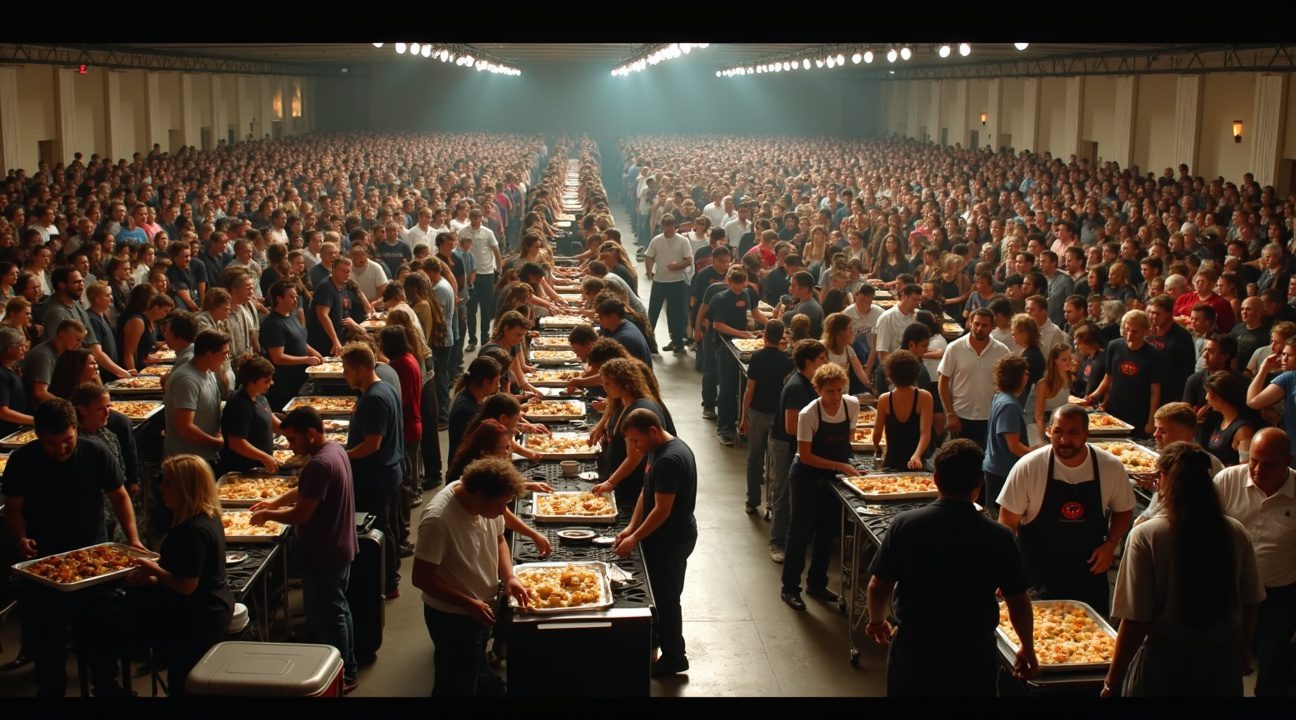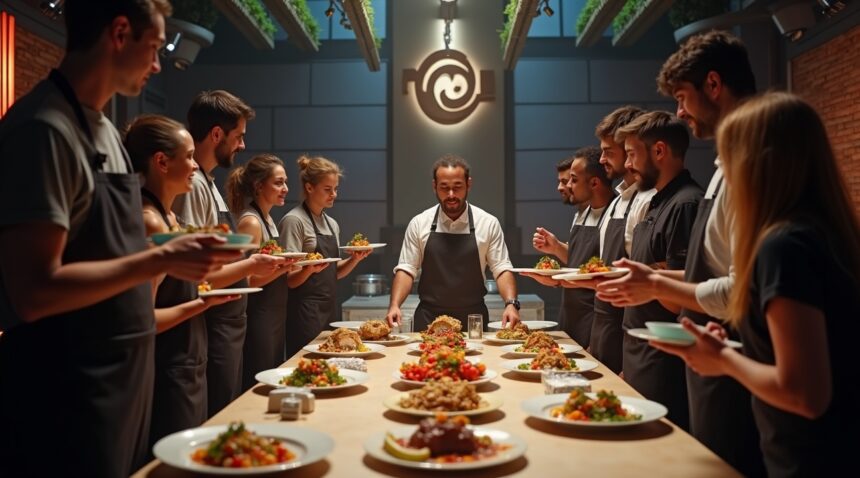MasterChef’s casting process functions as a rigorous selection system that converts thousands of amateur cooking enthusiasts into a small group of television-ready competitors through multiple elimination rounds spanning several months.
Key Takeaways
- Amateur-only eligibility strictly prohibits anyone with professional cooking experience, including those who have earned income from food preparation or worked as chefs.
- Multi-stage selection process begins with comprehensive online applications and progresses through in-person auditions where contestants have just 3-5 minutes to impress judges with pre-prepared signature dishes.
- Extreme competition odds with less than 1% of applicants making it past preliminary rounds, as casting directors select only 20-24 contestants from thousands of initial applications.
- Significant financial commitment requires contestants to cover all travel expenses for auditions and take 6-8 weeks away from work during filming with no income guarantee.
- Television-focused evaluation criteria emphasizes screen presence, personality, and storytelling potential equally alongside cooking ability, as producers seek contestants who can create compelling television moments.
Interested participants can learn more about the application process directly from the official MasterChef casting website, which outlines all current eligibility rules and audition instructions.
Only Amateur Home Cooks Welcome: The Strict Eligibility Rules That Keep Pros Away
MasterChef maintains strict eligibility criteria that create clear boundaries between amateur enthusiasts and professional cooks. I find these rules particularly interesting because they ensure the competition stays true to its core mission of discovering hidden culinary talent from everyday kitchens across America.
Age requirements differ dramatically between the two versions of the show. For MasterChef US, contestants must be at least 18 years old, while MasterChef Junior welcomes young cooks between 8 and 13 years old. This age gap creates distinct competitive environments that cater to different demographics and skill development stages.
The most critical rule centers on professional experience. Anyone who has worked as a chef professionally cannot apply for either version of the show. This prohibition extends beyond traditional restaurant roles — if an applicant has earned any income through cooking or food preparation, they’re automatically disqualified. The rule seems harsh, but it preserves the show’s authentic appeal of watching passionate home cooks transform under pressure.
Citizenship and residency requirements add another layer of qualification checks. Applicants must be legal residents or citizens of the United States to participate in the adult version. Additionally, producers require a current and valid passport since filming may include international travel segments. This requirement often surprises applicants who assume the competition takes place entirely within domestic locations.
Key Differences Between MasterChef and MasterChef Junior Requirements
- Age brackets create completely different competitive pools (18+ versus 8-13 years old)
- Adult contestants face stricter professional background scrutiny due to longer work histories
- Junior contestants undergo additional guardian consent and educational accommodation processes
- Travel requirements may vary, with junior contestants receiving enhanced supervision protocols
- Background checks differ in scope and depth between adult and child participants
Interestingly, some people excel at repeatedly attempting challenges, but MasterChef’s eligibility rules prevent former contestants from reapplying in most cases. These restrictions ensure fresh faces appear each season while maintaining the show’s commitment to discovering genuine amateur talent rather than recycling previous participants.
The professional cooking prohibition remains the most controversial aspect of these rules. Culinary school graduates who’ve never worked professionally can still apply, but someone who sold homemade cookies for profit cannot. This distinction highlights how seriously producers take the amateur designation that defines the show’s identity.

The Online Application Gateway: What It Really Takes to Get Noticed
The journey to MasterChef begins with a comprehensive online application that serves as the first filter in the casting process. Every hopeful contestant must complete an extensive digital form that goes far beyond basic contact information. The application dives deep into personal backgrounds, requesting detailed information about culinary education, professional cooking experience, and any food-related achievements or certifications.
Casting directors scrutinize responses to essay questions about cooking passion and culinary style. These aren’t simple one-line answers either – applicants typically need to demonstrate genuine enthusiasm and articulate their unique approach to food. The application asks about signature dishes, cooking influences, and what makes each person’s culinary perspective distinctive. I’ve noticed that successful applicants often share personal stories connecting food to their family heritage or life experiences.
Photo and video submissions carry enormous weight in the selection process. Recent, high-quality photos showing the applicant in their cooking environment help casting teams visualize how someone might appear on camera. These images shouldn’t be casual selfies – they need to convey personality while maintaining a professional standard that translates well to television production.
Video Submissions That Make the Cut
Video requirements present the biggest challenge for most applicants. The submission must showcase actual cooking skills while revealing personality traits that make good television. Smart applicants choose dishes they can execute flawlessly under pressure rather than attempting overly complex recipes that might fail during filming. The video should demonstrate knife skills, cooking techniques, and plating abilities while maintaining engaging commentary throughout the process.
For MasterChef Junior, parents shoulder the responsibility of creating compelling submissions that capture their child’s natural cooking abilities and charismatic personality. These videos require careful planning since children can’t always repeat perfect takes like adult contestants might. Success often comes from highlighting the child’s genuine enthusiasm for cooking rather than forcing overly polished performances.
Application deadlines create intense pressure for prospective contestants. The 2025 season closing date of July 20th at midnight PST gave applicants a specific target, but many seasons announce deadlines with only weeks of advance notice. This tight timeline means serious candidates should prepare materials year-round rather than scrambling when applications open. Some dedicated individuals have applied multiple times across different seasons, refining their submissions based on previous feedback.
Casting producers review thousands of applications for each season, making the initial cut extremely competitive. They’re looking for contestants who can cook well, handle pressure, and create compelling television moments. The application serves as a screening tool to identify candidates who possess both culinary skills and television-ready personalities.
Technical requirements for video submissions include specific file formats, length restrictions, and quality standards. Most applications request videos between three and five minutes long, filmed in landscape orientation with clear audio. Poor video quality can eliminate otherwise strong candidates, so investing in decent lighting and sound equipment pays dividends.
The online application also probes into personal availability and willingness to relocate temporarily for filming. Contestants must be prepared to leave jobs, families, and daily responsibilities for several weeks during production. Casting teams need to verify that selected contestants can fully commit to the filming schedule without external obligations interfering.
Background checks and health screenings become relevant after initial application approval. The online form begins collecting information that production teams will verify later in the process. Honesty during this stage proves crucial since any discrepancies discovered later can result in immediate disqualification.
Geographic diversity plays a role in casting decisions, with producers seeking contestants from various regions to create a nationally representative group. The online application captures location information that influences selection strategies, though exceptional candidates can overcome geographic considerations.
Smart applicants track their submission confirmation and follow application status updates through official channels. The waiting period between submission and initial response can stretch several months, during which contestants should continue developing their skills rather than simply hoping for callbacks.
High-Stakes Audition Day: Three Minutes to Impress the Judges
The casting process takes a dramatic turn when producers extend invitations to select candidates for in-person auditions. These high-pressure sessions don’t occur annually, but when they do happen, they represent the make-or-break moment for aspiring contestants.
Bringing Your A-Game: The Signature Dish Challenge
Audition participants face an immediate reality check – they must arrive with a completely prepared signature dish in tow. The production team provides zero kitchen facilities, no electricity, and absolutely no cooking equipment at the audition venue. This means contestants need to plan meticulously, ensuring their dish travels well and maintains its quality during transport. Smart candidates often choose recipes that taste exceptional at room temperature or can be quickly reheated with portable equipment.
The Three-Minute Pressure Cooker
Once inside the audition space, contestants experience the intense pressure that defines the MasterChef experience. Producers group participants together, then give each person a brief 3-5 minute window to plate their dish in front of the judging panel. This timing constraint mirrors the show’s fast-paced environment and tests how well candidates perform under extreme pressure.
The judging panel combines culinary expertise with television production knowledge, typically featuring both seasoned chefs and producers who understand what makes compelling television. During these crucial minutes, they’re evaluating multiple factors simultaneously. The dish’s taste and visual presentation carry significant weight, but judges also assess each participant’s personality, confidence level, and natural camera presence.
Contestants who succeed during this phase demonstrate more than just cooking skills. They show the ability to articulate their culinary vision clearly, maintain composure under pressure, and project the kind of engaging personality that translates well to television audiences. Some people excel under pressure while others crumble, and this audition day serves as the ultimate test.
The judges look for:
- Authentic passion
- Compelling personal stories
- Potential for dramatic television moments
- Ability to handle criticism
- Quick adaptability
- Engaging interaction skills
This evaluation process goes far beyond the food itself, encompassing the complete package that each potential contestant brings to the show.
https://www.youtube.com/watch?v=tMWBcxsKYUw
Behind the Producer’s Table: How the Final Cast Gets Chosen
The casting team faces a monumental task when selecting MasterChef contestants from thousands of applications. Producers don’t just evaluate cooking skills during this crucial phase. They’re searching for individuals who can captivate television audiences while demonstrating culinary potential.
Multi-Layered Assessment Criteria
Screen presence becomes equally important as cooking ability during the evaluation process. Casting directors look for these key qualities in potential contestants:
- Charisma that translates well on camera
- Relatability that helps viewers connect emotionally
- Storytelling potential through personal backgrounds and cooking journeys
- Natural ability to articulate thoughts under pressure
- Genuine passion for food and cooking excellence
I’ve observed that producers carefully balance personality types to create compelling television dynamics. They seek contestants who can handle the intense pressure of competition while maintaining authentic reactions that resonate with audiences.
Successful applicants advance through multiple interview rounds where producers probe deeper into their backgrounds, motivations, and camera presence. These sessions often involve cooking demonstrations combined with extensive questioning about personal histories and culinary aspirations.
The paperwork phase proves surprisingly extensive for advancing contestants. Legal waivers, medical clearances, and confidentiality agreements become standard requirements. Producers require detailed background information, employment verification, and sometimes financial disclosures. This documentation protects both the network and contestants while ensuring legal compliance throughout filming.
Background screenings represent another critical checkpoint in the selection process. Production teams conduct thorough investigations into applicants’ histories, checking for any issues that might create problems during or after filming. Social media accounts receive particular scrutiny, with producers examining years of posts for potentially problematic content.
Eligibility verification happens simultaneously with background checks. Contestants must prove their amateur status in cooking, demonstrate legal residency requirements, and confirm they meet age restrictions. Some extraordinary individuals have shown remarkable persistence in achieving their goals, though MasterChef typically limits the number of application attempts per person.
The competition for final spots becomes incredibly fierce at this stage. Production companies typically select between 20-40 contestants from tens of thousands of initial applications, creating acceptance rates lower than many prestigious universities. This selectivity ensures that only the most promising combination of cooking talent and television potential makes it to the actual competition.
Timeline considerations add another layer of complexity to the casting process. Initial applications usually open several months before filming begins, with various elimination rounds occurring over 8-12 weeks. Successful candidates must maintain flexibility with their schedules, as filming dates can shift based on production needs and external factors.
Producers often maintain alternate lists of qualified contestants who can step in if selected participants withdraw before filming begins. These standby contestants go through the same rigorous vetting process and must remain available on short notice. Some contestants might receive calls just days before production starts, requiring immediate availability and preparation.
The final casting decisions involve multiple stakeholders, including executive producers, network representatives, and sometimes the celebrity judges themselves. These decision-makers review extensive files on each potential contestant, weighing cooking demonstrations, interview performance, background checks, and projected storyline potential.
Geographic diversity also influences final selections, with producers typically ensuring representation from various regions and demographic groups. This approach helps create broader audience appeal while showcasing different regional cooking styles and cultural backgrounds.
Medical clearances become mandatory for all selected contestants, given the physical demands of competition and potential food allergies or health conditions that could impact filming. Production teams coordinate with medical professionals to ensure contestant safety throughout the entire filming process.
The casting process concludes with final contract negotiations and pre-production meetings where selected contestants receive detailed information about filming schedules, living arrangements, and competition rules. By this point, months have passed since initial applications, and successful candidates have demonstrated not only exceptional cooking skills but also the resilience and adaptability needed for television competition.
Life Inside the MasterChef Kitchen: The Reality of Filming
Once producers select contestants for the show, participants face a grueling six to eight-week filming schedule that typically runs from January through April. The production timeline demands complete dedication, as contestants must clear their schedules entirely during this period. Missing even a single day isn’t an option, and the show operates on a strict timetable regardless of personal circumstances.
Before stepping foot in the famous kitchen, every contestant signs comprehensive confidentiality agreements. These legally binding documents prevent any details about challenges, eliminations, or results from leaking to the public before episodes air. Breaking these agreements can result in significant financial penalties and legal action.
The Demanding Daily Schedule
Filming days stretch up to 12 hours, creating an exhausting environment that tests both culinary skills and mental endurance. Contestants often start before dawn and don’t finish until well into the evening. The cameras capture everything – from the intense pressure moments during challenges to the quieter interactions between participants.
Perhaps one of the most challenging aspects involves the memory requirement. Contestants cannot use recipes during any cooking challenge and must rely entirely on their culinary knowledge. This rule applies to everything from basic techniques to complex dishes, forcing participants to thoroughly prepare before arriving on set.
The elimination process remains unpredictable, and not everyone who films actually makes it to air. Some contestants get eliminated so early that viewers never see them compete, while others might appear only briefly in background shots. This harsh reality means that despite weeks of preparation and the time investment in filming, some participants won’t have their journey documented in the final edit.
Production covers certain costs, but contestants bear significant financial responsibility. All applicants must pay their own travel expenses to reach filming locations and audition venues. Additionally, they’re required to bring prepared food items for their auditions, which means purchasing quality ingredients and sometimes traveling long distances with perishable items.
The physical demands extend beyond just cooking. Standing for hours in a high-pressure environment while cameras roll takes tremendous stamina. Contestants must maintain energy and focus throughout marathon filming days, often while dealing with the stress of potential elimination. The kitchen environment itself adds another layer of challenge, with hot equipment, time pressure, and the constant presence of cameras and crew members.
Behind the scenes, production assistants monitor every aspect of filming. They ensure contestants follow rules precisely and maintain the show’s standards throughout the process. Any violation of guidelines can result in immediate elimination, regardless of culinary ability.
The competitive atmosphere intensifies as filming progresses. Contestants live together in provided accommodation, creating a pressure-cooker environment where alliances form and tensions rise. Sleep becomes precious, as participants often stay up late discussing strategies or simply trying to decompress from the day’s stress.
Camera crews capture reactions, conversations, and behind-the-scenes moments that might or might not make it into the final episodes. Contestants quickly learn that they’re always “on” — every moment could potentially be used in the show. This constant awareness adds psychological pressure that goes far beyond the cooking challenges themselves.
The reality of filming differs significantly from what viewers see on television. Editors condensate hours of footage into digestible episodes, which means the actual experience involves much more waiting, preparation, and repetition than audiences realize. Contestants might cook the same dish multiple times for different camera angles or redo certain segments if technical issues arise.
Even simple activities like eating meals or traveling between locations become scheduled events during filming. Personal time becomes virtually nonexistent, and contestants must adapt to a completely controlled environment where producers dictate their daily routines.
The Numbers Game: Understanding Your Real Chances of Making It
I wouldn’t be exaggerating to say the odds of landing a spot on MasterChef are astronomical. Open casting calls routinely draw hundreds to thousands of hopefuls in every city, creating an enormous pool of talent vying for just 20-24 coveted spots in the main competition. This massive funnel system means less than 1% of initial applicants ever make it past the preliminary rounds.
Breaking Down the Financial Reality
Aspiring contestants shoulder significant upfront costs before they even know if they’ll advance. Travel expenses to casting locations fall entirely on applicants, which can range from gas money for local tryouts to thousands in airfare, hotels, and rental cars for those traveling across the country. Additionally, contestants must finance their audition dishes, often experimenting with expensive ingredients multiple times to perfect their signature creations.
The financial commitment extends far beyond initial audition costs. Those fortunate enough to advance face the prospect of taking 6-8 weeks away from work for filming, with no guarantee of employment protection or income during this period. Many contestants describe this as one of the most challenging aspects of the entire process.
Even professional chefs find the competition intimidating given these steep odds. Home cooks often underestimate the level of culinary skill required, assuming their family’s praise translates to television-worthy talent. The reality proves much harsher – judges eliminate contestants with years of cooking experience within the first few challenges.
Production teams deliberately create this competitive environment to ensure only the most dedicated and skilled individuals advance. Industry professionals often compare the selection process to landing a major television role, where thousands audition but only a select few possess the right combination of personality, skill, and television appeal.
The sheer volume of applications also means casting directors can afford to be extremely selective. They’re not just looking for great cooks – they need compelling personalities who can create engaging television moments while handling intense pressure. This dual requirement further narrows an already impossibly small selection pool.
Understanding these odds shouldn’t discourage passionate cooks from trying, but it does highlight the importance of having realistic expectations. Most successful applicants treat the audition process as a valuable learning experience rather than a guaranteed path to television fame.

Sources:
MasterChef Casting Website FAQs – “FAQs – MasterChef Casting Website”
Delish – “40 Rules You Didn’t Know ‘MasterChef’ Contestants Have To Follow”
The Bossy Kitchen – “My Experience Casting for Master Chef US”
Celebration Generation – “Audition for MasterChef”
MasterChef Junior Casting – “How To Audition”
Be a Better Cook Blog – “My Audition for Master Chef – The Audition”
MasterChef.com – “Apply to MasterChef Casting Call”


